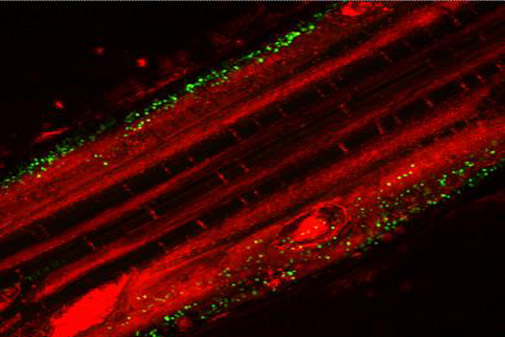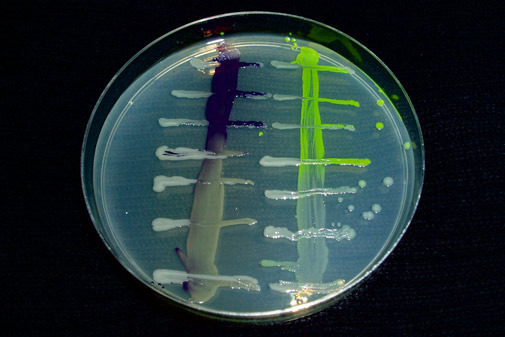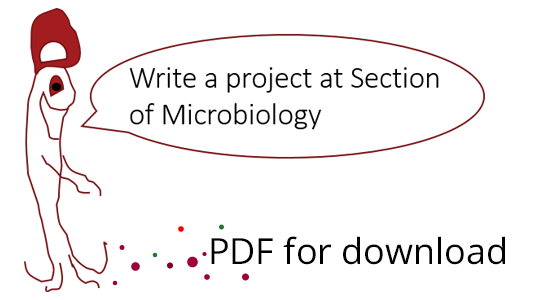The following courses are offered by Section of Microbiology:
 Advanced Bacteriology 1 &
Advanced Bacteriology 1 &
Advanced Bacteriology 2
MSC Programme in Biology
The course aims to give you insight into and understanding of areas of Advanced bacteriology. The course will provide you with both advanced theoretical and practical experience within important areas of bacteriology. The course is divided in two parts each counting 7,5 ECTS. Part 1 focus on Social Interactions and Part 2 on Bacteria/host/environment interactions. It is possible to finalize the course with an exam after part one. If signing up for both parts the course is finalized with one exam after part two.
The themes introduced in in the courses will include: Bacterial interactions, microbial biofilm and evolution, bacterial mobile genetic elements, bacterial physiology and identification, symbiotic and pathogenic bacteria, bacterial disease mechanisms and human bacterial pathogens.
Language: English
Credit: 7,5 ETCS or 15 ECTS
Level: Full degree Master
Duration: 1 block or 2 blocks
Placement: Block 1 and 2
Schedule: A
 Almen Mikrobiologi
Almen Mikrobiologi
Bacheloruddannelsen i biologi
Bacheloruddannelsen i naturvidenskab og it
Kurset i almen mikrobiologi har som formål at give et samlet overblik over mikroorganismerne med eksempler fra mikrobiologiens forskellige områder: stofskiftetyper, bakteriers diversitet, mikroorganismers aktivitet, forekomst og vækstforhold, deres genetiske stabilitet og mobilitet, patogenitet, evolution, økologiske betydning og bioteknologiske anvendelse. Kurset giver dig et basalt kendskab til de forskellige grupper af mikroorganismer og du tilegner dig sterilteknik og vil være i stand til at dyrke og isolere enkelte typer/stammer/arter fra blandede prøver fra naturen samt have fået en forståelse for forskellene mellem pro- og eukaryot genetik.
Sprog: Dansk
Point: 7,5 ETCS
Niveau: Bachelor
Varighed: 1 blok
Placering: Blok 2
Skemagruppe: A
 Microbial Biotechnology
Microbial Biotechnology
BSC Programme in Biology
BSC programme in Molecular Biomedicine
The course aims to give you insight into and understanding of areas of biotechnology research and provide background information on the molecular biological methods, which are prerequisites for this research. With the your own involvement in the lessons, it is expected that you will acquire the ability to participate in public discussion of related topics. Topics covered in the course included:
- Selected areas of research within microbial biotechnoloy
- Selected biotechnological processes related to microorganisms
- Danish biotechnology companies and their focus areas
- Natural environments as a prerequisite for microbial biotechnology
Language: English
Credit: 7,5 ETCS
Level: Bachelor
Duration: 1 block
Placement: Block 3
Schedule: C
 The Human Microbiome
The Human Microbiome
MSc Programme in Biology, MSc Programme in Biochemistry & MSc Programme in Molecular Biomedicine
This course will give students a thorough understanding of the microbial communities in and on humans. This includes the different roles of the communities in the well-being of humans and links to important human diseases like allergies, obesity, inflammatory bowel diseases, and diabetes. Students will obtain detailed knowledge on the different microorganisms shaping the microbiome of key human habitats, i.e. the colon, skin, oral cavity, vagina and lungs.
Language: English
Credit: 7,5 ETCS
Level: Full degree Master
Duration: 1 block
Placement: Block 1
Schedule: B
 The Human Microbiome - Experiments
The Human Microbiome - Experiments
MSc Programme in Biology, MSc Programme in Biochemistry & MSc Programme in Molecular Biomedicine
In this course the students will study their own microbiome and hence get hands on experience with all steps involved in studying the human microbiome. Humans harbour ten times more bacterial cells than human cells. Different parts of the human body are inhabited by specific microbial communities forming the human microbiome. Within recent years it has become clear that the human microbiome interacts extensively with their human host and is important for human health.
This course will give students a thorough understanding of and hands on experience with the experimental approaches, molecular methods, and bioinformatic analysis used to study microbial communities in and on humans. This includes: DNA extractions from complex microbiome samples, PCR amplification of the 16S RNA gene and other phylogenetic marker genes, and all other steps needed to prepare samples for next generation DNA sequencing. Students will be introduced to the basic principles of next generation DNA sequencing and finally get hands on experience with the bioinformatic analysis from initial quality filtering, OTU binning and final biological analysis of obtained data. Students will obtain detailed knowledge on the different microorganisms shaping the microbiome of key human habitats and the methods used to study them.
Language: English
Credit: 7,5 ETCS
Level: Full degree Master
Duration: 1 block
Placement: Block 4
Schedule: C
Contact
 Professor
Professor
Søren Sørensen
Email: sjs@bio.ku.dk
 Professor
Professor
Mette Burmølle
Email: burmolle@bio.ku.dk
 TT Assistant professor
TT Assistant professor
Jonas S. Madsen
Email: JSMadsen@bio.ku.dk
 Professor
Professor
Anders Priemé
Email: aprieme@bio.ku.dk


